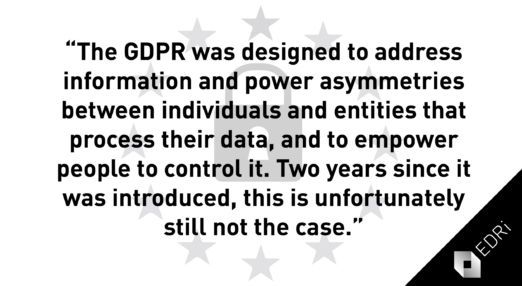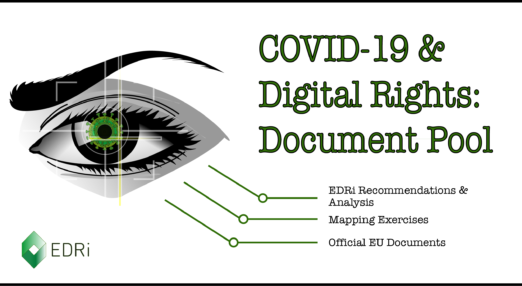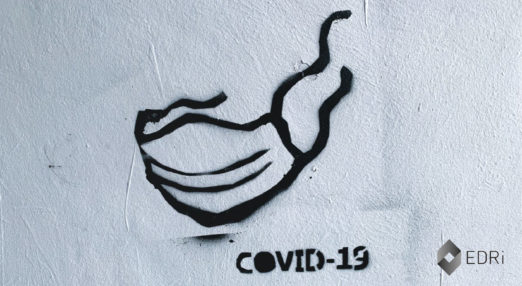Privacy and data protection
Filter resources
-

France: First victory against police drones
Since the beginning of the COVID-19 crisis, French police has been using drones to watch people and make sure they respect the lockdown. Drones had been used before by the police for the surveillance of protests, but the COVID-19 crisis represented a change of scale.
Read more
-

Open Letter: EDRi urges enforcement and actions for the 2 year anniversary of the GDPR
On 25 May 2020, for the General Data Protection Regulation (GDPR) 2 year anniversary, EDRi sent a letter to Executive Vice-President Jourová and Commissioner Reynders to highlight and urge action to the tackle the GDPR’s vast enforcement gap.
Read more
-

Ban biometric mass surveillance!
44 civil society organisations call for a ban on biometric mass surveillance in EDRi's new paper, "Ban Biometric Mass Surveillance: A set of fundamental rights demands for the European Commission and EU Member States"
Read more
-

Xnet issues two complaints to improve data protection in Spain
Xnet highlights gaps in Spain’s adaptation of the EU General Data Protection Regulation (GDPR). The Spanish member of EDRi has opened two complaints to the European Commission related to the lack of effective adaptation of the data minimisation principle and the lack of conciliation between personal data protection and freedom of expression and information in the Spanish legislation.
Read more
-

Google: seizing a crisis to legitimise mass surveillance?
Even in times of Corona, Google follows you wherever you go. The company collects and processes all our location data en masse and can thus graph how well we adhere to the imposed measures.
Read more
-

Austria’s biggest privacy scandal: residential addresses made public
Nobody took data protection into account for the so-called “Supplementary Register for Other Concerned Parties” (Ergänzungsregister für sonstige Betroffene). The Ministry for the Economy and the Finance Ministry are responsible for a data breach to which the Austrian Economic Chambers were an accomplice.
Read more
-

COVID-19 & Digital Rights: Document Pool
Find in this EDRi doc pool all relevant articles and documents around the COVID-19 crisis and digital rights.
Read more
-

Why COVID-19 is a Crisis for Digital Rights
The COVID-19 pandemic has triggered an equally urgent digital rights crisis. New measures being hurried in to curb the spread of the virus, from “biosurveillance” and online tracking to censorship, are potentially as world-changing as the disease itself.
Read more
-

COVID-19: A Commission hitchhiker’s tech guide to the App Store
How's does the European Commission's toolbox and data protection guidelines fit with the EDRi network's take?
Read more
-

Technology, migration, and illness in the times of COVID-19
In our ongoing work on technology and migration, we examine the impacts of the current COVID-19 pandemic on the rights of people on the move and the increasingly worrying use of surveillance technology and AI at the border and beyond.
Read more
-

COVID-19 pandemic adversely affects digital rights in the Balkans
Cases of arbitrary arrests, surveillance, phone tapping, privacy breaches and other digital rights violations have drastically increased in Central and Southeast Europe as governments started imposing emergency legislation to combat the COVID-19 outbreak.
Read more
-

COVID-Tech: Emergency responses to COVID-19 must not extend beyond the crisis
In EDRi's new series on COVID-19, we will explore the critical principles for protecting fundamental rights while curtailing the spread of the virus, as outlined in the EDRi network's statement on the virus. Each post in this series will tackle a specific issue at the intersection of digital rights and the global pandemic in order to explore broader questions about how to protect fundamental rights in a time of crisis.
Read more
